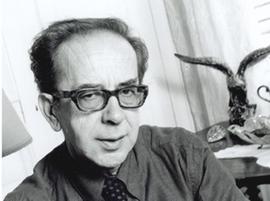 |
|
| Ismail Kadare | |
Albanian writer Ismail Kadare, who explored Balkan history and culture in poetry and fiction spanning more than 60 years, died July 1. He was 88. Writing under the shadow of Albanian dictator Enver Hoxha, Kadare "examined contemporary society through the lens of allegory and myth in novels including The General of the Dead Army, The Siege and The Palace of Dreams," the Guardian reported. "After fleeing to Paris just months before Albania's communist government collapsed in 1990, his reputation continued to grow as he kept returning to the region in his fiction." Kadare's books have been translated into more than 40 languages.
Albanian President Bajram Begaj praised Kadare as the country's "spiritual emancipator.... Albania and Albanians lost their genius of letters... the Balkans (lost) the poet of its myths, Europe and the world (lost) one of the most renowned representatives of modern literature."
"A giant of international literature, many of his works are already considered classics and will continue to be read far into the future," Harvill Secker's publishing director Liz Foley said. Canongate Books noted that Kadare "was one of the great writers of our age and we've no doubt that his books will live on for a very long time."
Kadare published his first collection of poetry when he was 17. After studying at Tirana University, he won a government scholarship to study literature at the Gorky Institute in Moscow, which inspired a novel about two students reinventing a lost Albanian text. When he published an extract in a magazine, it was banned, the Guardian wrote.
"It was a good thing this happened," Kadare said in 2005. "In the early '60s, life in Albania was pleasant and well-organized. A writer would not have known he should not write about the falsification of history."
When he published The General of the Dead Army (1963), a novel about an Italian general who travels across Albania in the 1960s to recover the remains of Italian soldiers who died during World War II, Albanian critics attacked it for the lack of the socialist realism required by Hoxha's regime, but when the book was published in France in 1970, it caused a sensation, the Guardian noted.
Kadare spent the next 20 years charting a course between artistic expression and survival. After his political poem "The Red Pashas" was banned in 1975, he painted a flattering portrait of Hoxha in his 1977 novel The Great Winter. In 1981, he published The Palace of Dreams, which was banned.
When Hoxha died in 1986, the new president, Ramiz Alia, began to take tentative steps towards reform, but Kadare decided after meeting with him that there was "no possibility of legal opposition in Albania" and that "more than any action I could take in Albania, my defection would help the democratization of my country." In Paris, Kadare began to publish work tackling totalitarianism more directly, with titles like The Blinding Order and The Pyramid.
He received the Légion d'Honneur as well as the inaugural Man Booker International prize, then a lifetime achievement award, in 2005; the Prince of Asturias Prize for the Arts in 2009; the Jerusalem Prize in 2015; and the America Award in Literature for a lifetime contribution to international writing in 2023. Kadare also produced poems, essays and screenplays.
"For a writer, personal freedom is not so important," Kadare once said in an interview. "It is not individual freedom that guarantees the greatness of literature, otherwise writers in democratic countries would be superior to all others. Some of the greatest writers wrote under dictatorship--Shakespeare, Cervantes. The great universal literature has always had a tragic relation with freedom. The Greeks renounced absolute freedom and imposed order on chaotic mythology, like a tyrant. In the west, the problem is not freedom. There are other servitudes--lack of talent, thousands of mediocre books published every year."

